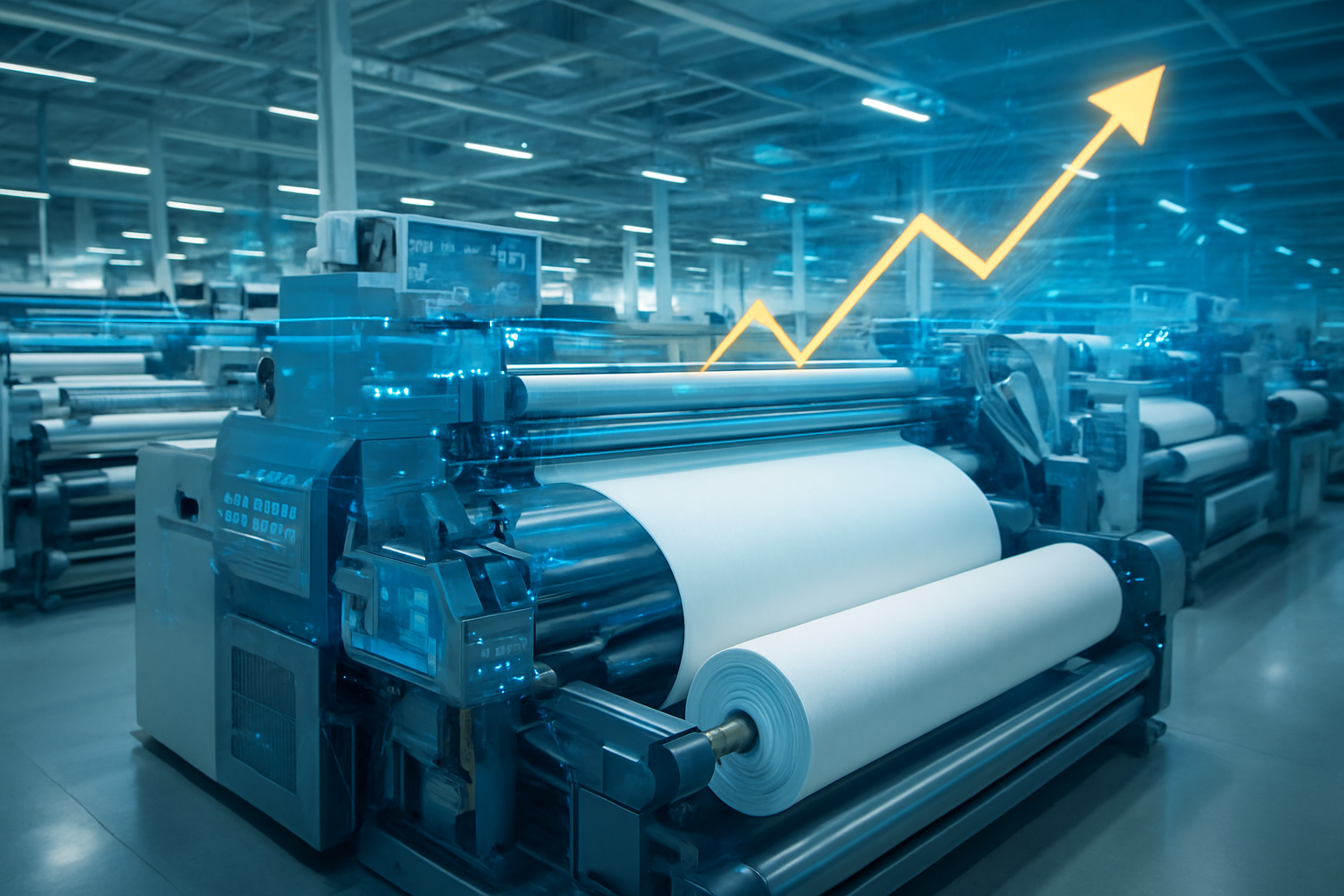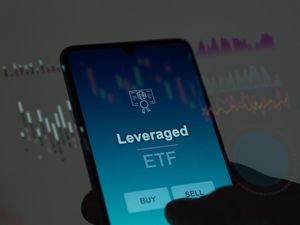
Shanghai-based MaxsMaking Inc. (NASDAQ: MAMK), a manufacturer specializing in customized consumer textile goods, made a dramatic entrance into the public market today, October 24, 2025, with its shares skyrocketing an astounding 148.70%. This significant surge, which saw the stock price climb to $7.43, marks a pivotal moment for the company following its initial public offering (IPO) on July 7, 2025. The remarkable performance signals robust investor confidence, largely fueled by the company's innovative and proprietary systems designed for highly efficient textile production.
The substantial leap in valuation underscores a growing market appetite for companies that leverage technology to revolutionize traditional manufacturing sectors. MaxsMaking's unique approach to integrating advanced software and patented production methods appears to be a key differentiator, promising enhanced efficiency and cost-effectiveness in the competitive customized consumer goods market. Investors are clearly betting on the company's ability to capitalize on these technological advantages to carve out a significant niche and deliver sustained growth.
A Meteoric Rise: MaxsMaking's IPO Journey and Market Debut
MaxsMaking Inc. (NASDAQ: MAMK) officially commenced trading on the NASDAQ Capital Market on July 7, 2025, offering 1,625,000 A shares at an IPO price of $4.00 per share and raising gross proceeds of $6.5 million. Joseph Stone Capital, LLC served as the sole underwriter for the offering. The company, founded in 2007, positioned itself from the outset as a technology-driven entity, aiming to integrate digital production, software development, product design, brand management, online sales, and international trade into a cohesive business model.
While the initial months post-IPO saw some volatility, with the stock experiencing fluctuations and even dipping below its IPO price at times (closing at $2.99 on October 23, 2025, and $2.21 in after-hours trading), today's performance represents a significant turnaround and a powerful validation of its long-term potential. The 148.70% climb on October 24, 2025, to $7.43 per share, has firmly placed MaxsMaking in the spotlight as a top gainer, drawing considerable attention to its operational strengths and strategic vision.
Investor enthusiasm is primarily anchored in MaxsMaking's commitment to technological innovation, particularly its suite of proprietary systems. These include custom-developed ERP (Enterprise Resource Planning), EMS (Execution Management System), and CRM (Customer Relationship Management) software. These integrated systems are crucial for managing complex bulk orders and streamlining the entire process from customer interaction to manufacturing. Furthermore, the company holds patented technologies that enable the efficient transformation of single-item printing to batch printing, significantly boosting both production efficiency and product quality in textile manufacturing.
The funds raised from the IPO were strategically earmarked to fuel this expansion and innovation. MaxsMaking plans to allocate approximately 45% towards the construction and expansion of its production facilities, 20% for potential strategic investments and acquisitions, 15% for new hires across various departments, 12% for marketing initiatives, and the remaining 8% for ongoing product and software research and development. This forward-looking allocation of capital underscores the company's ambition to solidify its technological edge and expand its market footprint.
Market Ripple Effects: Winners and Losers in the Textile Sector
MaxsMaking Inc.'s (NASDAQ: MAMK) explosive market debut is poised to send ripples throughout the textile manufacturing industry, creating potential winners and losers among its competitors and partners. Companies that have been slow to adopt advanced manufacturing technologies and digital integration may find themselves at a significant disadvantage, struggling to compete with MaxsMaking's enhanced efficiency and cost-effectiveness in customized production. Traditional textile manufacturers relying on older, less automated processes could face increased pressure on their profit margins and market share, especially in the rapidly evolving customized goods segment.
Conversely, companies that are already investing in or looking to integrate similar technological solutions could see an acceleration in their strategies. MaxsMaking's success might validate the business case for digital transformation in textile production, encouraging more investment in proprietary software, automation, and advanced manufacturing techniques across the industry. Suppliers of manufacturing automation equipment, industrial software solutions, and specialized textile printing technology could also experience increased demand as competitors scramble to upgrade their capabilities to match MaxsMaking's efficiency.
Furthermore, the rise of a tech-driven textile manufacturer like MaxsMaking could also impact the broader supply chain. Companies that partner with MaxsMaking, whether as raw material suppliers, logistics providers, or e-commerce platforms, stand to benefit from its growth and expanding production volumes. The increased demand for customized goods, facilitated by MaxsMaking's efficient systems, could also spur innovation in related sectors, such as fabric development and sustainable material sourcing, as the industry adapts to faster production cycles and diverse product offerings.
However, the competitive landscape for customized textile goods is vast, including both large established players and nimble direct-to-consumer brands. While MaxsMaking's proprietary systems offer a significant edge, other companies with strong brand recognition, extensive distribution networks, or unique design capabilities will remain formidable competitors. The challenge for MaxsMaking will be to leverage its technological advantage into sustainable market dominance, potentially requiring further investments in branding, customer acquisition, and global expansion to maintain its momentum against diverse rivals.
Broader Implications: Reshaping the Future of Textile Manufacturing
MaxsMaking Inc.'s (NASDAQ: MAMK) impressive market performance is not merely a corporate success story; it signifies a broader shift within the global textile manufacturing industry. This event strongly underscores the accelerating trend towards digital transformation and advanced automation as critical drivers of competitive advantage. In an era where consumer demand for personalized and on-demand products is escalating, MaxsMaking's ability to efficiently produce customized textile goods through proprietary software and patented processes positions it at the forefront of this industrial evolution. This success could serve as a powerful blueprint for other manufacturers seeking to modernize their operations and meet the demands of a fast-paced, individualized market.
The ripple effects extend beyond direct competition to potential shifts in global supply chains and manufacturing strategies. As a China-based manufacturer demonstrating high efficiency through technology, MaxsMaking challenges the traditional perception of manufacturing hubs primarily competing on labor costs. Instead, it highlights the increasing importance of technological sophistication and intellectual property in driving efficiency and quality. This could encourage other countries and companies to prioritize investment in R&D and automation to remain competitive, potentially leading to a more distributed and technologically advanced global manufacturing landscape.
From a regulatory standpoint, the rise of tech-driven manufacturers like MaxsMaking might prompt closer scrutiny of intellectual property rights and data security, especially for companies operating across international borders. As proprietary software and patented processes become central to business models, the protection of these assets will be paramount. Additionally, the enhanced efficiency and potential for rapid production could raise questions about labor practices and environmental sustainability, encouraging regulators and industry bodies to develop new standards for advanced textile manufacturing.
Historically, the textile industry has seen numerous shifts, from the industrial revolution's mechanization to the rise of fast fashion. MaxsMaking's current trajectory draws parallels to the early internet-era companies that disrupted traditional retail, demonstrating how technology can fundamentally alter established industries. Its success echoes instances where companies leveraging unique technological advantages, like Zara's agile supply chain in the past, gained significant market share by responding quickly to consumer trends. MaxsMaking's innovative approach suggests a new paradigm where efficiency in customization, driven by advanced software and automation, is the next frontier.
The Road Ahead: Navigating Opportunities and Challenges
The future for MaxsMaking Inc. (NASDAQ: MAMK) appears bright in the short term, with the immediate post-IPO surge indicating strong investor confidence. The company's strategic allocation of IPO proceeds towards facility expansion, R&D, and talent acquisition suggests a clear path for continued growth and technological enhancement. In the coming months, investors will be closely watching for execution on these plans, particularly the successful scaling of its production capabilities and the integration of new hires to support its expanding operations. Continued innovation in its proprietary systems and the successful penetration of new markets for its customized textile goods will be crucial for sustaining this momentum.
In the long term, MaxsMaking faces both significant opportunities and potential challenges. The global demand for customized consumer goods is projected to grow, offering a vast addressable market for its efficient production model. Strategic partnerships, potential acquisitions of complementary businesses, and further international expansion could unlock substantial new revenue streams. The company's focus on proprietary technology also creates a strong moat, making it difficult for competitors to replicate its efficiency without significant investment in R&D and infrastructure.
However, challenges loom. The textile industry is subject to evolving consumer trends, raw material price volatility, and geopolitical factors, especially for a China-based manufacturer. Maintaining its technological edge will require continuous investment in R&D to stay ahead of competitors and adapt to new manufacturing paradigms. Furthermore, as MaxsMaking scales, managing supply chain complexities, ensuring consistent product quality, and navigating diverse regulatory environments across different markets will become increasingly critical. The potential for new entrants or disruptive technologies could also pose a threat, necessitating strategic pivots and continuous adaptation.
Potential scenarios range from MaxsMaking becoming a dominant global player in customized textile manufacturing, setting new industry standards for efficiency and personalization, to facing increased competition that erodes its margins. The company's ability to convert its technological prowess into sustainable profitability, expand its brand recognition, and effectively manage its growth will determine its ultimate trajectory. Investors should monitor quarterly earnings reports, announcements regarding new patents or technological advancements, and any strategic partnerships or expansion plans to gauge the company's progress.
A New Fabric for the Market: MaxsMaking's Lasting Impact
MaxsMaking Inc.'s (NASDAQ: MAMK) remarkable 148.70% climb today is more than just a single-day market anomaly; it represents a significant validation of a business model built on technological innovation in a traditional industry. The key takeaway is the profound impact that proprietary software and advanced manufacturing processes can have on efficiency, cost-effectiveness, and investor perception within the textile sector. MaxsMaking's success highlights that the future of manufacturing lies not just in volume, but in the intelligent integration of technology to meet evolving consumer demands for customization and speed.
Moving forward, the market will be keenly observing how MaxsMaking leverages its newfound capital and investor confidence. Its performance will likely serve as a benchmark for other companies in the textile and broader manufacturing sectors considering similar digital transformation initiatives. The event signals a potential shift in investment priorities, favoring companies that can demonstrate a clear technological advantage and a scalable model for personalized production.
In conclusion, MaxsMaking Inc. has woven a compelling narrative of innovation and market potential with its successful IPO and subsequent stock surge. The lasting impact of this event could be a renewed focus across the industry on R&D, automation, and the development of proprietary systems to gain a competitive edge. What investors should watch for in the coming months are the tangible results of MaxsMaking's strategic investments, its ability to expand market share, and its continued commitment to pushing the boundaries of efficient textile production. The company's journey will undoubtedly offer valuable insights into the future direction of global manufacturing.
This content is intended for informational purposes only and is not financial advice





